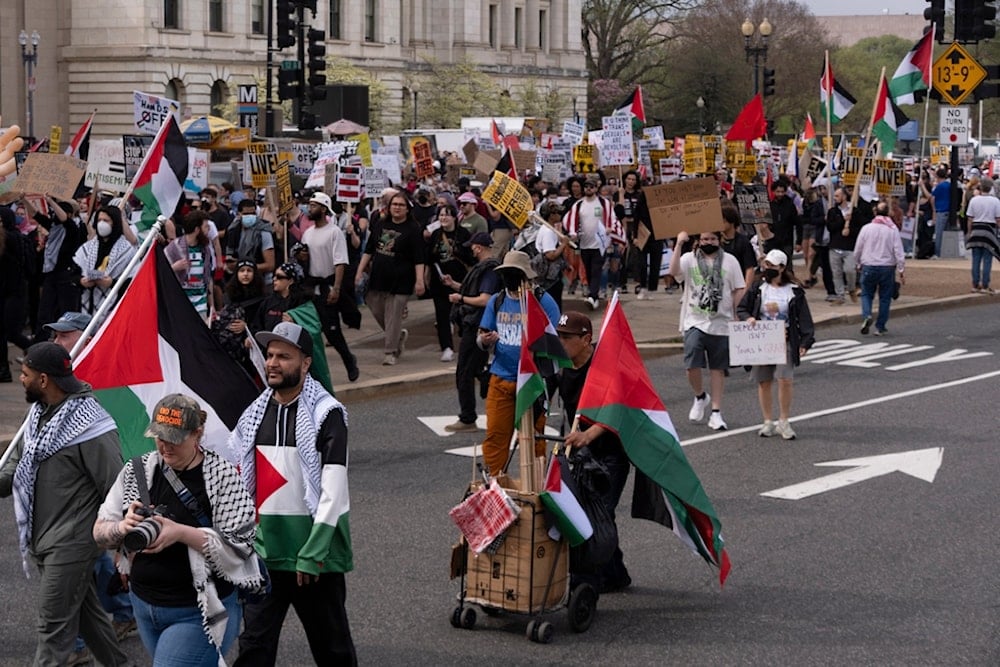US House to vote on bill criminalizing boycott of 'Israel'
The US House is set to vote on a bill criminalizing boycotts of the Israeli regime, with penalties of up to $1 million or 20 years in prison.
-

Pro-Palestinian protesters march toward the US Immigration and Customs Enforcement (ICE) headquarters, Saturday, April 5, 2025, in Washington. (AP)
The US House of Representatives is preparing to vote on a controversial bill that would impose severe penalties, including steep fines and lengthy prison terms, on American citizens who participate in boycotts of the Israeli regime or its illegal settlements when such boycotts are promoted by international bodies like the United Nations or the European Union.
The vote on the so-called anti-boycott legislation is scheduled for Monday. If passed, the bill would expand existing US anti-boycott laws to penalize individuals for taking part in peaceful, values-driven political actions; most notably those aligned with the Boycott, Divestment, and Sanctions (BDS) movement.
Co-sponsored by pro-Israeli lawmakers Mike Lawler and Josh Gottheimer, the legislation proposes punishments of up to $1 million in fines or up to 20 years in prison.
Rights organizations have condemned the bill, warning that it would criminalize constitutionally protected free speech and political expression. Advocacy groups argue that the law is part of a broader US effort to suppress criticism of the Israeli regime and shield it from accountability for its ongoing genocide in Gaza, systemic apartheid, and continued expansion of illegal settlements.
Originally introduced in 2024, the bill passed the then-Republican-controlled House but was blocked in the Senate by Democrats. With Republicans now holding majorities in both chambers, the bill has a strong chance of becoming law.
The American Israel Public Affairs Committee (AIPAC), the most influential Israeli lobbying group in the United States, has declared that it "strongly supports" the legislation. Similarly, the Foundation for Defense of Democracies (FDD) Action has backed the bill and broader efforts in Congress to counter boycott campaigns targeting the Israeli occupation.
Growing concerns over humanitarian catastrophe
The push for this legislation comes as international boycotts continue to grow in response to the Israeli regime's war on Gaza, which has killed more than 52,500 Palestinians and wounded at least 118,000 others, most of whom are women and children. The aggression comes amid a stifling blockade that has terribly worsened the humanitarian situation in Gaza, leaving children to starve to death.
Following two months of a cruel blockade imposed by "Israel" on Gaza, Amnesty International has called on the occupation to immediately lift its devastating siege, describing it as a genocidal act, an unlawful form of collective punishment, and a war crime involving the use of starvation as a weapon.
By obstructing the entry of essential supplies needed for the survival of civilians, "Israel" is continuing a policy that deliberately creates life-threatening conditions for Palestinians in Gaza; conditions Amnesty says are designed to bring about their physical destruction, amounting to genocide.
An inferno of death, destruction
New, harrowing testimonies collected by Amnesty International in April reveal the severe humanitarian consequences of "Israel’s" total blockade, where starvation and the denial of vital resources are being weaponized in blatant violation of international law.
“The extent of human suffering in Gaza for the past 19 months has been unimaginable, and it is a direct consequence of Israel’s ongoing genocide. Apart from a brief respite during the temporary truce, Israel has relentlessly and mercilessly turned Gaza into an inferno of death and destruction,” said Erika Guevara Rosas, Amnesty International’s Senior Director for Research, Advocacy, Policy, and Campaigns.
"Apart from a brief respite during the temporary truce, Israel has relentlessly and mercilessly turned Gaza into an inferno of death and destruction."
Rosas urged the global community to act, calling on "Israel’s" allies to pressure it to lift the siege, allow unhindered humanitarian aid, and implement a sustained ceasefire to prevent further atrocities.

 4 Min Read
4 Min Read








